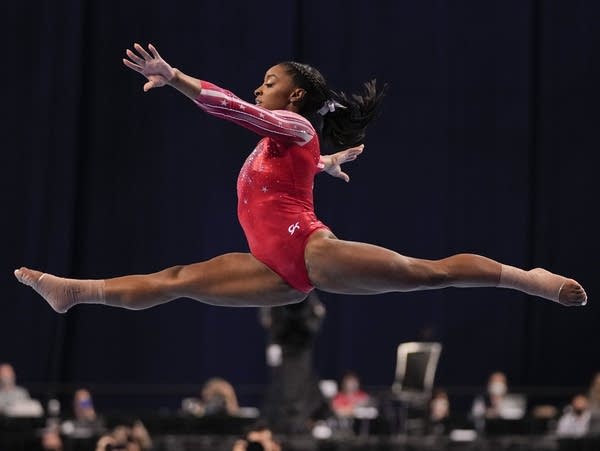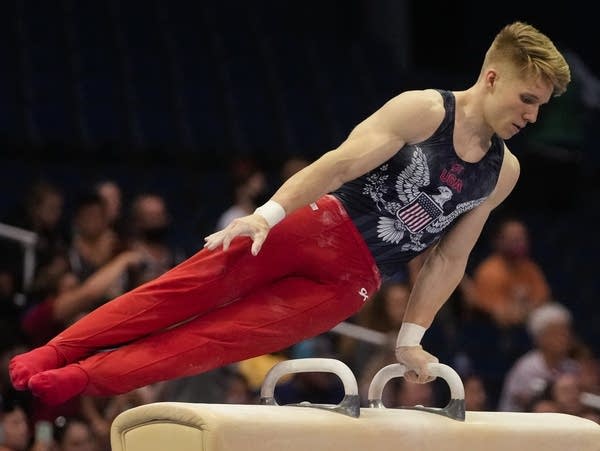Biles, Lee lock up spots on U.S. Olympic gymnastics team

Go Deeper.
Create an account or log in to save stories.
Like this?
Thanks for liking this story! We have added it to a list of your favorite stories.
Updated: 10:05 p.m.
Simone Biles' Olympic encore is finally here.
The reigning world and Olympic gymnastics champion locked up her spot in Tokyo by easily winning the U.S. Olympic Trials on Sunday night. The 24-year-old's two-day total of 118.098 earned her one of two automatic spots on the plane to Japan next month, where she will try to become the first female gymnast in more than 50 years to win consecutive all-around Olympic golds.
St. Paul's Sunisa Lee earned the other automatic bid with a 115.832 while posting the top scores on beam and uneven bars and actually putting up a higher all-around score than Biles on the night.
Jordan Chiles — who hasn't fallen in 24 routines in 2021, something even Biles can't say — is also heading to Tokyo two years after it appeared her elite career might be in jeopardy.
Turn Up Your Support
MPR News helps you turn down the noise and build shared understanding. Turn up your support for this public resource and keep trusted journalism accessible to all.
Grace McCallum of Isanti, Minn., rounds out the four-woman team after coming in fourth during trials.

MyKayla Skinner, an alternate in 2016, will go as a specialist. The 24-year-old will be a threat to medal on vault.
Kayla DiCello, Kara Eaker, Leanne Wong and Emma Malabuyo will serve as the alternates.
Biles' teammates will have a front-row spot to what promises to be one of the biggest spectacles in the games.
Biles will arrive in Tokyo as the face of her sport, U.S. delegation and perhaps the Olympic movement. She's become more than just a gymnastics star since her coronation in Rio in 2016. Her consistent excellence — her last second-place finish in a meet came more than nine years ago — combined with her charisma and her possibility-pushing routines have thrust her into the company of Michael Phelps and Usain Bolt, athletes whose dominance on the world stage have made them Olympic icons.
Sports stops to watch when she does her thing. And after a difficult time grappling with the postponement of the Tokyo Games to the COVID-19 pandemic, Biles appears better than ever.
Well, most of the time.

Biles was spectacular on Friday. On Sunday, not so much — at least by her remarkable standards — in front of a crowd of well over 20,000 inside The Dome at America's Center that roared every time she stepped on the podium.
She nearly stalled out on her uneven bar routine and her balance beam set was a battle from the second she began her wolf turn early in her set. Biles reached down to grab the 4-inch slab of wood at one point and shortly thereafter hopped off in disgust. She drilled her “double-double” dismount — the one named after her — before trudging to her seat in tears. Her floor routine included a big hop out of bounds after her “triple-double” opening pass. Not that anyone noticed. She walked off to a standing ovation even as she gave coach Laurent Landi a somewhat exhausted-looking smile.
She has three weeks to fume and perfect in her bid to make history.
Biles earned five medals in Rio de Janeiro. She could do the same in Tokyo. And Lee has a chance to come home with a fistful of hardware, too.

The 18-year-old from Minnesota is a wonder on the uneven bars, one of a handful of gymnasts on the planet who can out-Biles Biles on the event. Her series of intricate connections — all done with a fluidity and grace that makes it look effortless — are among the most difficult in the sport. Lee dealt with an Achilles injury that led her to a sluggish start to the 2021 competition season.
Those days are over. Lee, who will be the first Hmong American at the Olympics, finished a strong runner-up to Biles at nationals earlier this month and appears to be getting stronger with each passing week.
Jade Carey of Arizona also has an Olympic berth locked up after earning a nominative pot based on her World Cup performances. Carey will compete as an individual, meaning she will not be a part of the team competition.
The Americans will be heavily favored to win their third straight Olympic title and their talent pool is so deep that the selection committee is basically just naming the score if the U.S. is anywhere close to its A-game.
Minnesota's Wiskus makes men's Olympic team

Brody Malone tried to block it all out. The stakes. The scores. The noise. His ears wouldn't cooperate.
So yeah, Malone knew exactly where he was in the standings at the Olympic trials for men’s gymnastics on Saturday In the lead. In control. And comfortable.
Good thing, because the 20-year-old with the soft southern drawl that betrays his northwest Georgia roots better get used to it. He's probably going to be there for a while.
Equal parts stoic and spectacular, Malone put on a command performance while racing to victory and the automatic berth on the Olympic team that came with it. Malone's all-around total of 171.600 was a good three points ahead of Yul Moldauer and the rest of the field.
Perhaps just as importantly for an American team that's looking to scratch its way onto the podium in Tokyo next month, Malone seemed immune to the circumstances. It was hard to tell at times if he was in the middle of the meet of his life or just putting in another solid training session back at Stanford.
“What a stud," U.S. men's high-performance director Brett McClure said. “I mean, he competed with ice in his veins. He just looked unshakable.”
A mindset Malone hopes to carry with him to Japan. Even as his lead grew and his spot became all but assured, Malone tried to stay in his “bubble.” The only real show of emotion coming after he stuck his dismount on rings, when he pumped his arms three times as he made his way off the mat, the Olympic goal that first seemed tangible following his first NCAA title in 2019 finally a reality.
Malone headlines an Olympic team that is a mixture of fresh faces and veterans who know exactly what to expect while competing under the unique spotlight provided by the games.
Sam Mikulak made his third Olympic squad, the 29-year-old six-time national champion overcoming a fall on pommel horse — long his nemesis — to get a nod from the selection committee after finishing fourth.
“This has been the hardest year to make ever for my life,” said Mikulak, who has been very candid about how the COVID-19 pandemic affected his mental health. “I would say this is probably the most (meaningful Olympic berth). The one that feels the hardest.”
Moldauer, the 2017 national champion and a three-time world championship team member, earned an automatic berth by finishing behind Malone and in the top three on three disciplines with an energetic display of both technique and emotion.

Shane Wiskus' gamble of leaving the University of Minnesota to train at the Olympic and Paralympic Training Center last fall after the Gophers opted to cut their program following the 2021 season paid off. Wiskus bounced back from a rough finish at nationals in which he fell three times on high bar to claim third.
“I’ve just been through the wringer and I kind of told myself that, ‘You know, I’ve been through enough and I’m ready to kind of show what I can do at this competition,’” Wiskus said. “So, man, it’s just been a crazy year and you just can’t make this stuff up.”
Alec Yoder, who terrifyingly flew head-first off pommel horse at the 2015 national championships, earned the “plus-one” specialist spot by overcoming a bit of nerves with a pommels routine that impressed the selection committee with its difficulty.
Brandon Briones, Cameron Bock, Akash Modi, Allan Bower and Alex Diab will serve as the alternates.
The Americans have slid back to the middle of the pack internationally in recent years. The men's program hasn't medaled at a major competition since earning bronze at the 2014 world championships. The program's last Olympic medal came in Beijing in 2008, when Malone was still in elementary school and splitting his time between gymnastics and rodeo riding, among other things.
“I’m tired and I know these guys are tired of playing catch up, just trying to get one skill here, one skill there just to be competitive,” McClure said. “And we’re all ready to take that next step to really focus on pushing the difficulty.”
And pushing each other.
“The cool thing about this team is we've got to see each other grow up and to watch each other at competitions and to rise when the moments there,” Moldauer said. “So we all know that we can hit under pressure, you know, and we can just move as a unit through one event at a time and it's going to be exciting.”
All five men competed collegiately, and their selection comes at a time when the sport is faltering at the NCAA Division I level. Minnesota's program was shuttered after more than 115 years this spring, leaving only six left in the Big Ten.
Wiskus, who still competed for the Gophers while training and studying remotely in Colorado, laughingly said he planned to send “a message or two" to Minnesota athletic director Mark Coyle about Coyle's controversial decision to cut men's gymnastics.
The NCAA has long been a proving ground of sorts for the U.S. elite program. McClure considered the display by the five men who will represent the country in Japan a pretty good endorsement of the doors the sport can open.
“I think it should send a message to all the athletic directors and university presidents out there that if they’re thinking about adding sports, that gymnastics is thrilling and it breeds excellence, elite and Olympians,” McClure said.


